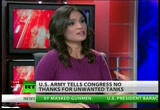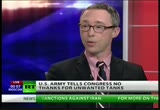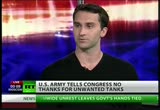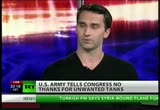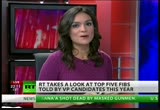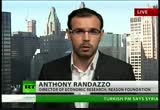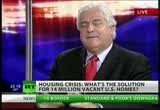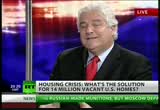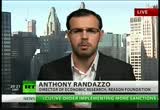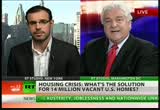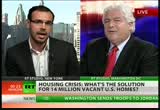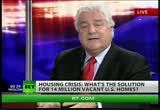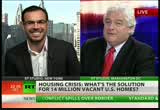tv [untitled] October 11, 2012 4:00pm-4:30pm EDT
4:00 pm
from science to. don't come. today on our t.v. thanks but no tanks that's what the u.s. army and defense secretary leon panetta are telling congress when it comes to the one abrams but despite the pentagon's attempt to save three billion dollars congress is forcing the pentagon to repair the tanks anyways we'll tell you about the latest case of wasteful government spending. plus it's the least important debate of election season and yet tonight's vice presidential debate is sure getting a lot of attention but while the media gets caught up in the middle of the v.p. who global fact check these political foes. and if the u.s.
4:01 pm
were a motel the vacancy sign would be burning bright millions upon millions of empty houses and no immediate plans for what to do with up to bulldoze them or fix them up that's a bait i had. with thursday october eleventh four pm here in washington d.c. i'm liz wall and you're watching r t well government officials debate the best way to cut the budget the country's massive defense spending has come under scrutiny but it turns out even when the pentagon wants to cut back they don't have congress's support take this example the pentagon wants to save three billion dollars by foregoing the reform of the tanks you see there with the war is winding down the army is finding it don't need any more of them many lawmakers say if we start making the ten. that would hurt the economy and put thousands of jobs on the
4:02 pm
line but it also turns out that the companies that manufacture these tanks are major contributors to congressional campaigns so is this the kind of defense spending about or is this about national security or getting reelected to discuss this and more i'm joined now by ben freeman national security investigator for the project on government oversight and also paul mccleary a land warfare reporter for defense news welcome gentlemen to the both of you thanks for so i'm going to start with the bad washington they're talking about cutting the deficit the pentagon is they're pointing out the easy way to do so but it's congress wants them to keep on spending this money what you think is going on this a clear example of when politics interferes with good policy and with good national security we have a pentagon who's saying to you hey we don't need these tanks we need to find a lot of ways to save a lot of money there some serious cuts to pentagon spending right around the corner
4:03 pm
and the pentagon has basically said we can afford to cut these weapons here we could save a lot of money by doing it but then you have these politicians many of whom are getting campaign contributions from the very firms that are making these tanks saying hey we want you to go ahead and buy these tanks anyways even though you don't need to this is just bad government spending this is bad for national security what it involves is another example of wasteful spending. the army in order to close down the plant in lima ohio where the tanks are made. in two thousand fourteen one to be opened in two thousand and seventeen now because about six hundred million dollars so they'd save two point four billion. roughly so. the tanks the army wants the tanks and it just depends when they want them. and what kind of what kind of variance they want but it looks like they have more than enough tanks as it is to meet the defense needs so why bring any more in there. i think a lot of it is modest modernizing the tanks they have there is they will be building
4:04 pm
some new tanks of congress because the way most of it is modernization program bring them up to the next level of networking and communications ok presumably we have the winding down of the wars in iraq and afghanistan and therefore the army doesn't need as much of this equipment these tanks as more specifically but i mean what do you think do you think that they are still relevant and modern warfare in the climate today they are. the marines have some tanks in afghanistan currently i know that the canadians in the danes had great success using tanks in the concert is the counterinsurgency campaign in afghanistan put in a counterinsurgency you don't need the number of tanks that you need facing off against a threat so it tends to have a place in the future not as large as maybe we thought they did ten fifteen years ago but the will be a force to be reckoned with and in future conflicts or perhaps they have a place but not as big of a place you know who is kind of on the forefront of this speaking out against
4:05 pm
wasteful spending is senator rand paul let's take a listen to him speaking about this very topic the overriding problem to me in washington and for a country is that debt the only way we're ever going to figure out our debt problem is we have to compromise conservatives like myself who believe national defense is very important will have to say that not every dollar spent on the military is sacred. what do you think about do you think that military spending is considered sacred and off limits. i think in a lot of cases it is in i think we need to change that mentality we've heard from admirals leading figures in the military itself that the national debt is the greatest threat to national security and when you start taking that more seriously when we consider the weapons were preparing for example the asia pivot well if we're going to pivot to asia and we're going to devote a lot of resources to there if we're simultaneously increasing our debt to china by
4:06 pm
doing that it's sort of hypocritical to do in the long run we need to think about national security we need to think about jobs and economic security is a big part of that our military is the greatest in the world and there's no danger in that if we cut a little here and there where we can and you had mentioned earlier our lobbying in the lobbying dollars that goes for the defense industry to what extent do you think that lawmakers are swayed by the lobbying power of the defense industry or i think it matters immensely especially in a campaign season there's thousands of lobbyists working for the defense industry every single day and those lobbyists are also making campaign contributions those companies are donating tens of millions of dollars in these campaigns and so in an election year when every single dollar matters when when you need a lot of money for those campaign commercials literally your job is on the line for some of these representatives so with these deep pocketed pentagon contractors can come in and provide that money it does matters immensely all right but you
4:07 pm
lawmakers are saying if we cut this kind of spending it will lead to significant lobs job loss which will in turn hurt the economy polity you think about that is that a good a good reason to justify the spending is it's a part of it i mean the plant was able as tanks are made are is in lima ohio and there are jobs at stake in the ohio what the members of congress from ohio and don imus will say is that these are highly skilled jobs to hundred place if you shut the line down for three years it'll be hard. to reconstitute the line and to hire back those skilled workers because all of gone to their jobs right but you know what the economy isn't it kind of supply and demand is the pentagon is saying that they don't need this we don't need this is an oversupply why should we keep feeding a demand that isn't there. it comes on jobs and all politics is local in the shouldn't there be a reorganization of jobs then instead of pumping out things that we don't need i
4:08 pm
think that's probably above the above what the army is capable of doing well that the army is now saying that they don't need them they're there at the forefront of this saying hey we don't need these tanks and then the congressmen have to answer to the voters of ohio are saying yes we do need them because we need the jobs well i guess i'm going to ask you to respond to that what do you think then i think the question here is if we're going to assume that we want to government to create jobs for us we need to ask what the most efficient way to do that is and researchers found that military spending is one of the least effective ways that the government can create jobs there's plenty of more beneficial programs out there education for example health care these are all shown to be better producers of jobs with government spending than the military so if this really is a question of jobs the military simply isn't the best way to do it all right and this is just one example we're talking three billion dollars and if these this seaquest ration does take into effect and congress cannot agree on the budget we're talking five hundred billion dollars that's what the defense industry stands to
4:09 pm
lose so is this just this is kind of just scratching the surface right. it's important that five hundred billion dollars in context number one that's over ten years number two when you consider the scale of the defense budget that's really not a gigantic cut that basically would take defense spending to what it was in two thousand and six two thousand and seven we're fighting two wars then. the military has grown exponentially since nine eleven so this is a cut out of out of a department that has grown measurably so this is not going to decimate us it's not going to be catastrophic we'll still be by far the strongest military in the world all right well we have a big debate tonight in the vice presidential debate paul do you expect this defense spending to be on the table. highly unlikely i'm sure though though i'm sure joe biden will will make reference to it just because he's noble foreign policy. defense and he's he pushed them or
4:10 pm
a program. the army marines didn't necessarily want some sort of bring it up but i don't imagine will be will be too large a piece of what do you think that before i was ron paul's kind of rallying point we heard him kind of this was what he tried to press over and over and over again the fact that we should take a look at defense spending now you know we're down to the republican and democratic vice presidential candidate you think it will be part of the discussion i think it will be but i think paul's probably right it probably won't take center center stage jobs are going to be the key issue tonight possibly health care in taxes some of those other issues but hopefully we do hear more about it because it's a critical issue absolutely and i guess we're going to have to tune in tonight to find out gentlemen appreciate both of you coming into the studio that was ben freeman the national security investigator for the project on government oversight and also paul mcleary land warfare reporter for defense news. well tonight much of america will turn their televisions on to the vice presidential debates but what
4:11 pm
will they find their wealth the past year in the previous debate are any indication the audience will likely hear vice president joe biden and representative paul ryan telling a bunch of have truth so to make sure you're ready we're prepared five of the biggest lies told during this campaign season by the vice presidential candidates let's start with paul ryan lauded by pundits as a budget guru with a great grasp on all things math let's see how he does when asked about it on fox if you haven't given me the math. i don't know that it would take me too long to go through all of the math but let me say it this way you can lower tax rates by twenty percent across the board by closing loopholes and still have preferences for the middle class. and that's just a small clip of his dodging chris wallace is clearcut question if he stopped avoiding it he would have more time to give the math now on to joe biden who has been an attack dog for president obama during the campaign but he's found more
4:12 pm
people to attack than republicans watch this i would argue that is closer to being the high tech terrorist and then the pentagon papers put in jeopardy the lives. and . occupations of people in other parts of the world. saying that the wiki leaks releases have killed americans as a charge without any substantiation which which americans were killed by wiki leaks it's easier to find victims of his administration's drone war paul ryan's got some more woes himself listen to him explain why he didn't take us general's opinion into account when he wrote his budget we don't think the generals are giving us their true advice we don't think the generals believe that their budget is really the right budget all ryan later apologize for this remark after general dempsey challenge ryan to call the general a liar to his face it's clear who the liar really was in this instance on the other
4:13 pm
hand it seems like biden prefers to lie about cyberspace listen to this utopian vision of cyber freedom which citizens do online should not as some have suggested be decreed solely by groups of governments making decisions for them somewhere on hind. too bad it's not true under the obama administration we've seen cyber surveillance continue and in some cases increase look at the repass age of internet social media subpoenaed by the us government and a general clampdown of the internet under the trans-pacific partnership which is under negotiation and would give you more details about the t p p except the negotiations are taking place in secret and now to one of the most audacious lies of the campaign this one is from paul ryan speech at the republican national convention he created a new bipartisan debt commission they came back with an urgent report. he
4:14 pm
thinks them since i'm on the way and then did exactly nothing. a lot of this is true but guess who was part of the simpson bowles commission that's right the man you just heard paul ryan and he rejected the report long before president obama did so tonight as you watch the debate as something sounds like it just isn't true you could be right. government officials here in washington are trying to figure out what to do with the millions of empty homes is a problem cities across the country are facing some of them are vacation homes others waiting to be rented or sold but many of them are not even on the market it's the aftermath of a bleak housing market here's a look at just how many of these homes are vacant nine point nine million homes have been foreclosed upon since two thousand and eight and as of two thousand and eleven there were about fourteen point three million year round vacant housing
4:15 pm
units in the us vacant properties have increased by forty three point eight percent nationwide since two thousand so what exactly should we do with these empty homes elizabeth duke a federal reserve board governor is posing this question she says it will cost money to tear them down or convert them but would doing nothing be even more devastating to the economy to discuss i'm joined now by john taylor president and c.e.o. of the national community reinvestment coalition and from our new york studio anthony rand dazzle director of economic research at the reason foundation welcome gentlemen so john i will i'll start off with you what do you think we should do with these empty homes when we actually absolutely need to do something with them i mean we have a homeless problem we have the highest rents in the country now that we've had in many years we have a lot of people who could be qualified homeowners who could buy these properties if they were renovated brought up to speed. the idea of plowing and perfectly good
4:16 pm
homes only a perfectly good homes just is an awful concept it makes absolutely no sense but it is it is the untapped on finished problem of this housing crisis we had foreclosures new data was out today very good news for the president for the economy that's lowest levels of foreclosure filings since july of two thousand and seven but the. the fourteen million plus vacant in the band in the homes is absolutely the thing we need to deal with next but i look at it as an opportunity not just as a problem all right and what do you think is this an opportunity to jump in and do something with these millions of empty homes or at all there's something that the federal government should be doing these homes as a matter of fact i think the biggest thing we can do is we can pull back policies both in the treasury department with how they're running fannie mae and freddie mac. as well is the federal reserve's policies which are sort of propping up housing prices
4:17 pm
so we can actually lower housing prices in this country everybody seems to want housing prices to go up as if somehow that makes them more affordable what makes a product more affordable is if you have lower price and so you're one of the reasons why you have all these vacant homes that aren't even on the market creating this illusion that we have you know a low amounts of vailable housing and we should be building more homes it's because housing prices have been propped up from where they really should be falling too and we're not out of the housing bubble yet i know it's several years since the housing bubble started to collapse but we're still at inflated housing prices so one way to get these homes out of sort of the vacancy status and into the hands of people like you john was talking about people who want to own these homes is to pull back federal policies that are propping up prices so that these homes can actually be affordable so anthony it sounds like you're talking about the private sector jumping in. and this kind of being able to remedy it is that your say i
4:18 pm
think i think it definitely can be able to remedy itself if the if there's no longer an expectation that prices are going to go up dramatically why would a home not be put on the market because the owner thinks that oh if i just wait six months a year or two the housing market's going to get better and seven are by talking about a million homes for million homes and some of these i went and covered a story in detroit a few months ago these neighborhoods completely davus. it abandoned homes you really think that these neighborhoods can recover on their own i think they are certainly a case for most of them now there certainly are going to be neighborhoods where there's no homes that are being occupied and so you want to maybe can that's going to be a little bit of a different neighborhood in detroit absolutely it's my hometown there are neighborhoods where every home not only is it vacant but it needs a lot to be put into it and i think the people to carry those costs are the people who invested them in the first place they're the ones that made the bad investment
4:19 pm
they're the ones that sort of reap the costs if they're going to walk away from that and then it's put onto the city then if there is a role for government it's only then when the owner completely walks away from it wipes their hands of it they're going to get nothing back could something be done and then i think i've got a whole day that is holding back here and think i just want to say it's that same free market in that same investment community that got us into this mess to begin with creating you know these these bernie madoff kind of schemes in which. all sorts of investment money was used to buy mortgage backed securities that were were just bad loans that were unsustainable that were made by brokers and lenders just for the purposes of getting their fees it didn't matter to them whether the homeowner paid it back because they were all being sold to the the wall street and everybody in between except the investor and the homeowner was was making money so you know and listen by the way fannie and freddie are in fact selling a lot of these homes and guess who's right and they have buying all these
4:20 pm
properties and that's that same investment community you're talking about so what you're what you're saying is is in fact happening and happening increasingly on a big scale the question is are they going to make these homes are they going to simply sit in these homes until the market turns around and then and then two or three years later flip them so that they make in double digit returns on investment or are they going to rehab these properties and really help stabilize neighborhoods and create decent afforded. sustainable housing that's going to make a difference in the detroit's of the world and elsewhere i mean so it it's i think what we need is a sensible mixture of the private sector of the government working with local mayors and cities and towns and you know making sure that there's jobs created i mean this think of the opportunity with fourteen million homes if we began to train people and hire people to become top earners plumbers electricians sheet metal workers roofers whatever to reclaim these properties and rebuild them we're talking about having you know a tremendous job development program while we're reclaiming these properties bring
4:21 pm
in the back on the market and and and you know and then be on the market like any other property and competing for prices and rents and then that's really a good thing for this country for that and john without sort of getting into a whole debate over the financial crisis one thing i point out is that we actually use the same language back in the eighty's and ninety's about sort of a healthy mixture of the private sector and government planning to try and create jobs in create more homeownership and what we got was fannie mae and freddie mac. and what they do is they collaborate with wall street and many of the ways that you're complaining about the the fannie mae and freddie mac. programs right now of selling homes to investment banks is a terrible light so neither one of neither one of us supports that idea so we have just only we must the lived in different countries because my recollection of what happened and i was right in the middle of observing all because perhaps like you.
4:22 pm
was that fannie and freddie actually lost tremendous market share to the subprime market which was selling to wall street and they went from being two point seven trillion dollars agencies. assets on the management of the securitized portfolio to one point seven they lost a trillion dollars in three years to the private sector market so you're not talking about getting rid of the market are you not talking about holding the market accountable or are they you know you're. actually saying i'll bring those guys back and let them now by the properties that have been devastated by bad policies look i agree with the oversight of fannie and freddie accountability absolutely necessary thing but let's let's not give this broad brush free pass to the private sector market as if they didn't play a role are they there they don't have a rule of law that also needs to apply them of course john i wouldn't give a pass to to wall street whatsoever that they made a lot of mistakes and i wouldn't give a pass to the regulators so i think they also made a lot of mistakes i think by i think i think we probably agree both sides are in a huge make you know mess part of the whole mess that we got into the question is
4:23 pm
right now in terms of dealing with these homes is the answer to go back to another similar program that could create a whole bunch more of these sort of unintended consequences or is the answer for those homes to go to families that can afford them at prices that they can afford which would be lowering than they are right now i don't and having them develop those pro and have them to help those homes and you're right i mean i don't think anything but that is on the table nobody i think we now have a consumer protection agency united states of america did not have a consumer financial protection agency so a lot of these things happened without anybody having any oversight to ensure that bad things were reined in so we now have i think also and let me just say we also have dodd frank you know for all the criticism of dodd frank what dodd frank also has in it is that prohibits these unsavory unsustainable lending practices including making a loan to someone who doesn't have the ability to pay so whatever you think of dodd frank this stuff in there including the consumer agency that's going to ensure that
4:24 pm
that sort of thing that you were just talking about is not going to care occur in the future and i agree with you working with the private sector you know but they're not going to do things in a way other than to maximize profit which may be just to be a slum landlord for two three years flip the property down the road when the housing market comes back and we just need more thoughtful purposeful you know engagement by the. it sector and that's not going to happen if you just say let the free market be free free to abuse free to you know only think about one thing and that's profit for the for their investor i want to bring up another point here because as these homes millions of them stand vacant and there's a lot of other consequences i mean these neighborhoods i thought of course to use to trade as another example in detroit is just one of many cities suffering from this city is plagued by foreclosure vacant homes these are areas where property values also suffer and also you see a higher crime rate so you talk about that how so there's other consequences of the
4:25 pm
biggest consequence of all and i think in theory probably agree with me is as these properties continue as we've seen more foreclosures as the properties continue to deteriorate because a lot they're not just sitting there people going in there trashing them they're taken value out of them through taking the copper and appliances and other things so that those properties continue to worsen what happens to people who most americans eighty eight percent of all americans who are paying on their mortgages it and have prime loans is the a value of their property the equity is is being lost in the process so we have to stop the bleeding and until we deal with these they can be in the properties in the foreclosures we're going to stop the bleeding it's good for everybody for us to be able to create sustainable occupied healthy homes we have just done minute last anthony go ahead that well it's trying to get back to it all that one thing i think we should make sure that we are completely aware of is things like dodd frank are keeping the house prices of homes too high they're constricting already make and
4:26 pm
they're keeping the price of homes too high and we don't need to have a society that is all homeowners we can have societies where some people rent and some people own homes only have you and john and john cleary that have public policies that focus on just trying to make sure everybody is a homeowner is to put us right back in the mentality of both private and public sector got us into this mess here i don't have the libertarian argument but let me say this the only thing that interests. credit right now is the fact that investors don't want to be best in america because they don't trust banks and they don't trust that this is a safe place to invest when they're already has they don't have the leisure suits or they have the lessons of the. from two thousand to two thousand and eight all the unsavory unsustainable lending that was done while being told these were good investment all right gentlemen i really really appreciate a healthy debate but we are out of time thank you to the both of you for coming on the show and talking about this very important topic and that was john taylor president and c.e.o.
4:27 pm
of the national community reinvestment coalition and anthony randolph director of economic research reason foundation. well coming up next on our team is the capital account with lauren lister let's check in with lauren to see what is on today's agenda lauren i have liz that was a healthy debate i was. quite economic to on that note let's talk economy but let's talk about it in the context of what you are likely to hear in the vice presidential debates tonight because when you look at some of the big picture issues facing the united states issues of resource security issues of access to clean water issues of commodities and energy these are some of the large scale issues that will really affect affect the country long term they are the ones that you typically hear politicians go to their bully pulpit and talk about so we're going to talk about what you won't hear but how vastly important they are to the future of the united states and what the cost will be if they are brought to the
4:28 pm
national discussion we have steven levy is a commodities expert that's in just a couple minutes just a couple minutes a lot to look for there thanks laura and that's going to do it now for the news from one of the stories we covered go to our you tube channel you tube dot com slash r t america our web site r t v dot com slash usa or follow me on twitter outlets a while back and a half hour. yes . download the official ati application to yourself choose your language stream quality and enjoy your favorites from matsushita now t.v. is not required to watch on t.v. all you need is your mobile device to watch r.t. and any time any of the.
32 Views
Uploaded by TV Archive on

 Live Music Archive
Live Music Archive Librivox Free Audio
Librivox Free Audio Metropolitan Museum
Metropolitan Museum Cleveland Museum of Art
Cleveland Museum of Art Internet Arcade
Internet Arcade Console Living Room
Console Living Room Books to Borrow
Books to Borrow Open Library
Open Library TV News
TV News Understanding 9/11
Understanding 9/11



